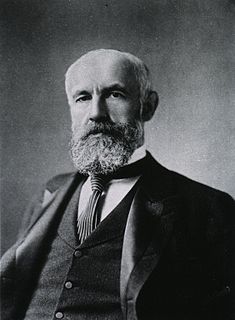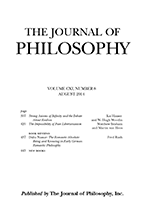Related Research Articles

John Dewey was an American philosopher, psychologist, and educational reformer whose ideas have been influential in education and social reform. He was one of the most prominent American scholars in the first half of the twentieth century.

Social science is the branch of science devoted to the study of societies and the relationships among individuals within those societies. The term was formerly used to refer to the field of sociology, the original "science of society", established in the 19th century. In addition to sociology, it now encompasses a wide array of academic disciplines, including anthropology, archaeology, economics, human geography, linguistics, management science, political science, psychology, and history.

Alexander Bain was a Scottish philosopher and educationalist in the British school of empiricism and a prominent and innovative figure in the fields of psychology, linguistics, logic, moral philosophy and education reform. He founded Mind, the first ever journal of psychology and analytical philosophy, and was the leading figure in establishing and applying the scientific method to psychology. Bain was the inaugural Regius Chair in Logic and Professor of Logic at the University of Aberdeen, where he also held Professorships in Moral Philosophy and English Literature and was twice elected Lord Rector of the University of Aberdeen.

Teachers College, Columbia University (TC) is a graduate school of education, health, and psychology in New York City. Founded in 1887, it has served as one of the official Faculties and the Department of Education of Columbia University since its affiliation in 1898. Teachers College is the oldest and largest graduate school of education in the United States.

Granville Stanley Hall was a pioneering American psychologist and educator. His interests focused on childhood development and evolutionary theory. Hall was the first president of the American Psychological Association and the first president of Clark University. A Review of General Psychology survey, published in 2002, ranked Hall as the 72nd most cited psychologist of the 20th century, in a tie with Lewis Terman.

Today, psychology is defined as "the scientific study of behavior and mental processes." Philosophical interest in the human mind and behavior dates back to the ancient civilizations of Egypt, Persia, Greece, China, and India.

The Journal of Philosophy is a monthly peer-reviewed academic journal on philosophy, founded in 1904 at Columbia University. Its stated purpose is "To publish philosophical articles of current interest and encourage the interchange of ideas, especially the exploration of the borderline between philosophy and other disciplines." Subscriptions and online access are managed by the Philosophy Documentation Center.
Gerald C. Davison is an American psychologist and professor. He is the current Professor of Psychology and Gerontology and former dean of the Leonard Davis School of Gerontology at the University of Southern California.
Francis Cecil Sumner was an American leader in education reform. He is commonly referred to as the "Father of Black Psychology." He is primarily known for being the first African American to receive a Ph.D in psychology. He worked closely with G. Stanley Hall during his time at Clark University, and his dissertation—published in Pedagogical Seminary, which later became the Journal of Genetic Psychology—focused on "Psychoanalysis of Freud and Adler."

Karl Ludwig Bühler was a German psychologist and linguist. In psychology he is known for his work in gestalt psychology, and he was one of the founders of the Würzburg School of psychology. In linguistics he is known for his organon model of communication and his treatment of deixis as a linguistic phenomenon. He was the dissertation advisor of Karl Popper.
Tom Polger is a professor in the Department of Philosophy at the University of Cincinnati in the United States. His research focuses on naturalistic accounts of the metaphysics of mind. Polger is a past president of the Southern Society for Philosophy and Psychology.
Lyle H. Lanier was an American experimental psychologist and writer.

George Malcolm Stratton was an American psychologist who pioneered the study of perception in vision by wearing special glasses which inverted images up and down and left and right. He studied under one of the founders of modern psychology, Wilhelm Wundt, and started one of the first experimental psychology labs in America, at the University of California, Berkeley. Stratton's studies on binocular vision inspired many later studies on the subject. He was one of the initial members of the philosophy department at Berkeley, and the first chair of its psychology department. He also worked on sociology, focusing on international relations and peace. Stratton presided over the American Psychological Association in 1908, and was a member of the National Academy of Sciences. He wrote a book on experimental psychology and its methods and scope; published articles on the studies at his labs on perception, and on reviews of studies in the field; served on several psychological committees during and after World War I; and served as advisor to doctoral students who would go on to head psychology departments.
The Society for Academic Freedom and Scholarship (SAFS) is a Canadian non-profit organization founded to promote academic freedom and intellectual excellence on Canadian institutions of higher education.

Shepherd Ivory Franz was an American psychologist. He was the first chairman of the psychology department at the University of California, Los Angeles and served as president of the American Psychological Association. Franz was the editor of multiple psychological journals and he contributed research to the concepts of neuroplasticity, afterimages and cerebral localization. He spent many years affiliated with George Washington University School of Medicine and the Government Hospital for the Insane, later known as St. Elizabeth's Hospital.

Joseph Peterson was an American psychologist and a past president of the American Psychological Association (APA).
J. Macbride Sterrett (1847–1923) was an American philosopher.
Robert Morris Ogden (1877–1959) was an American psychologist and academic. He served as the dean of the Cornell University College of Arts and Sciences from 1923 to 1945. He was the first proponent of Gestalt psychology in the United States.
H. J. Pearce (1871–1943) was an American psychologist. He was the founder of Brenau College, and served as its President from 1900 to 1943.

The 1904 United States presidential election in North Carolina took place on November 8, 1904. All contemporary 45 states were part of the 1904 United States presidential election. North Carolina voters chose 12 electors to the Electoral College, which selected the president and vice president.
References
- 1 2 3 4 5 "Southern Society for Philosophy and Psychology". Southern Society for Philosophy and Psychology. Retrieved 14 August 2015.
- ↑ Scientific and Technical Societies of the United States, National Academies, 1968, volume 8, p. 175